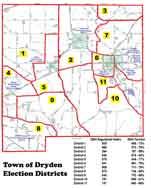Stormwater Runoff
Well, I know lots more about stormwater management than I knew yesterday morning. Still, 98% of what I know can be summed up by saying, "We should do it." I have in my hands a draft of "Town of Dryden Local Law for Stormwater management and Erosion and Sediment Control."
Last night at the Planning Board meeting Dan (it will probably be weeks before I can write Dan's last name without looking it up) led a discussion of the proposed. According to his notes, the goal of the 1972 Clean Water Act is to insure that all waters of the United States are "fishable" and "swimmable." Phase I addressed regulation of sewage treatment plants and industrial waste. I get that part. For the moment I'll just skip over the next sentence, "It also included Non Point Source discharges through grant programs for agriculture and Hydrologic Habitat Modification, and regulation of stormwater discharges resulting from large scale development in threatened waters (almost entirely downstate) and select developments that disturbed over 5 acres at a time."
Now, thirty-three years later, we're in phase II of the Clean Water Act which "seeks to regulate discharges that affect water quality and quantity." This involves: 1. Regulated Municipal Separate Stormwater Sewer Systems, and 2. Construction activities disturbing greater than one acre. I don't know what #1 is. Luckily #2 is self-explanatory.
The Clean Water Act, a federal law, requires local governments to regulate, among other things, stormwater runoff. A model local law is provided by the EPA. The Dryden Environmental Council has been working on the model law (all twenty-four pages of it) for several months and has passed it, with their modifications, on to the Planning Board. Later this year the Planning Board and the Environmental Council will make recommendations to the Town Board.
The challenge to the Board will be to use this legislation as an opportunity to show Dryden residents some of the pollution problems in Cayuga Lake, Fall Creek and Six Mile Creek and to explain what individuals can (and soon, must) do to help fix the problems.
Watch this space as I struggle to understand the technical language in the proposed law and translate it and pass it on.
Meantime, you can get ahead of me by reading the Clean Water Act or the simpler What is Stormwater Runoff?
Last night at the Planning Board meeting Dan (it will probably be weeks before I can write Dan's last name without looking it up) led a discussion of the proposed. According to his notes, the goal of the 1972 Clean Water Act is to insure that all waters of the United States are "fishable" and "swimmable." Phase I addressed regulation of sewage treatment plants and industrial waste. I get that part. For the moment I'll just skip over the next sentence, "It also included Non Point Source discharges through grant programs for agriculture and Hydrologic Habitat Modification, and regulation of stormwater discharges resulting from large scale development in threatened waters (almost entirely downstate) and select developments that disturbed over 5 acres at a time."
Now, thirty-three years later, we're in phase II of the Clean Water Act which "seeks to regulate discharges that affect water quality and quantity." This involves: 1. Regulated Municipal Separate Stormwater Sewer Systems, and 2. Construction activities disturbing greater than one acre. I don't know what #1 is. Luckily #2 is self-explanatory.
The Clean Water Act, a federal law, requires local governments to regulate, among other things, stormwater runoff. A model local law is provided by the EPA. The Dryden Environmental Council has been working on the model law (all twenty-four pages of it) for several months and has passed it, with their modifications, on to the Planning Board. Later this year the Planning Board and the Environmental Council will make recommendations to the Town Board.
The challenge to the Board will be to use this legislation as an opportunity to show Dryden residents some of the pollution problems in Cayuga Lake, Fall Creek and Six Mile Creek and to explain what individuals can (and soon, must) do to help fix the problems.
Watch this space as I struggle to understand the technical language in the proposed law and translate it and pass it on.
Meantime, you can get ahead of me by reading the Clean Water Act or the simpler What is Stormwater Runoff?



1 Comments:
I would have to agree with you about how most people should take stormwater runoff seriously and that it's worth doing.
Post a Comment
<< Home